Somber departures from war-torn Ukraine
March 21, 2022
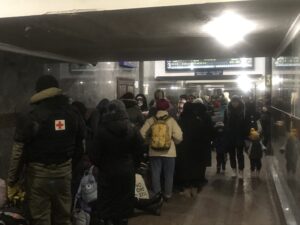
Passengers waiting to board trains at the railway station in Lviv, Ukraine, located near the Polish border
By JOSH FRIEDMAN
For hours upon hours, Ukrainian refugees speak to one another in Russian while fleeing their cities and towns, and often, their country.
Beside a CalCoastNews reporter, a woman, her mother and her daughter boarded a train departing the Ukrainian capital Kyiv for Lviv, the leading city in Western Ukraine near Poland. The female refugees said they were heading to Germany.
The two women and the girl waved an emotional goodbye to men in their family, who were standing outside the train car at Kyiv’s central railway station. The men would be staying behind, since Ukraine’s current war times measures ban 18 to 60-year-old men from leaving the country.
“Very sad,” the woman said in English, upon waving goodbye.
Two friends of hers — a father and a child — had already been killed in the war, she said. The woman described their killing as similar to what had just occurred to an ambushed American journalist, whose death made headlines both inside and outside of Ukraine.

Inside a compartment aboard a train headed from Kyiv to Lviv
The woman spoke with her mother and daughter in Russian for a couple hours, sporadically joking and laughing, and then attempted to get some sleep. The woman and her daughter climbed onto the the two top bunks in the train compartment, which proved to be a bit of a challenge.
“Oh, I am a princess,” the woman said, switching to English, as she climbed onto the bunk bed.
With the window shade pulled down after sunset — so as not to give off light that could incidentally make the train a target for fighter jets — the three females went to bed. The train would arrive at the Lviv station shortly after 3 a.m. Even in the middle of the night, there was standing room only for most people inside the Lviv train station, a scene emblematic of the ongoing exodus from Ukraine.
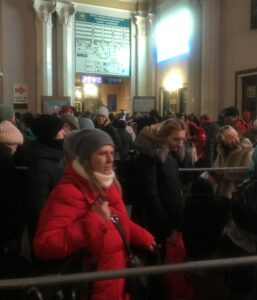
The central hall of the Lviv railway station well before dawn
Later, on a train across the border in Poland, Ukrainian refugees conversed in Russian with one another for four hours before arriving at the destination, the Polish city of Krakow. Upon arrival, the refugees were addressed in Ukrainian over the train intercom.
“Slava Ukraini” (glory to Ukraine) was announced on the intercom. The passengers responded with the traditional reply, “Heroyam slava” (glory to the heroes).
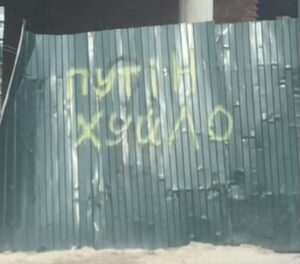
“Putin khuylo” graffiti in Kyiv
One man added, “Putin khuylo,” a commonly used slur deriding Russian President Vladimir Putin.
Part of the aim of Putin’s interventions in Ukraine, be it lending support to separatists or full-scale invasion, is to protect the Russian speakers of the country. Yet, many of the very Russian speakers Putin declared he would protect are fleeing bombs, missile strikes, shelling, gunfire and an all-out assaults on their cities and towns.
Critics of Putin’s actions argue his military campaign is causing millions of Russian-speaking Ukrainians to hate Russia.
Kremlin supporters, on the other hand, say the invasion is justified, in part, because of the Ukrainian military’s attacks on Russian speakers in the Donbas region over the last eight years. Likewise, they claim Ukrainian Nazis or Neo-Nazis are abusing their fellow Ukrainians or even holding them hostage.
Justified or not, Russia’s invasion of Ukraine is now in its fourth week. The death toll is in the thousands; various cities, particularly Mariupol, have become humanitarian disasters; and more and more shelling and air strikes are ravaging civilian-populated areas.
“I would love to leave Ukraine for some time,” one Kyiv man said following intensified air strikes in the Ukrainian capital. “Bad thing is I cannot leave. I’m stuck.”
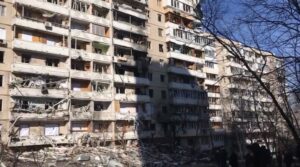
Apartment building in Kyiv following an air strike. Photo by Mykyta Demydiuk
As a few million or more Ukrainians have fled the country, many men have stayed behind to partake in the war effort in one capacity or another. Other Ukrainians, particularly in besieged Mariupol, have become stuck with no way out.
“The shelling isn’t stopping for a day,” Maksym Zhorin, a former commander of Ukraine’s Azov Regiment, said when asked by CalCoastNews about the situation in Mariupol. “The corpses of civilians that are laying down in the streets are not even being buried because we have no opportunity to approach, and in the best case, small mass graves are made just in the streets.”
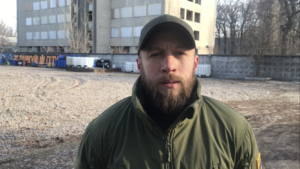
Maksym Zhorin, former Azov Regiment commander
Mariupol, a largely Russian speaking city, is the geographical base for the Azov Regiment, a former paramilitary unit that is now part of the Ukrainian National Guard. The Azov Regiment has fought pro-Russian forces in Ukraine dating back to 2014. Conversely, the Russian government has deemed the Azov Regiment to be a hotbed for Nazism in Ukraine. The military unit has and/or previously had ties to far-right political ideology.
Whether or not Russia is battling Nazism, as claimed by Putin, its bombs, missiles, mortars and gunfire are wreaking havoc on Ukraine and the lives of Ukrainians. Millions of Ukrainians, a large percentage of whom are native Russian speakers, are fleeing this mayhem. Others, willfully or not, are not as lucky.






The comments below represent the opinion of the writer and do not represent the views or policies of CalCoastNews.com. Please address the Policies, events and arguments, not the person. Constructive debate is good; mockery, taunting, and name calling is not. Comment Guidelines